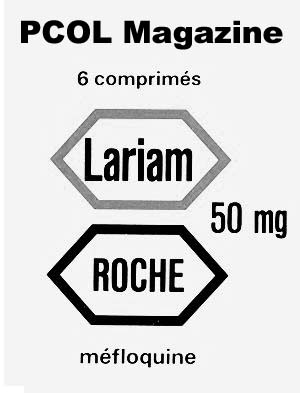
Approved in 1983 by the Food and Drug Administration, this anti-malarial product was developed by the Walter Reed Army Institute of Research in collaboration with the World Bank, the World Health Organization (WHO) and the pharmaceutical giant, F. Hoffman-La Roche (Roche) of Basel, Switzerland. Since its introduction 20 years ago, millions of people have taken the drug as both a prophylaxis (preventative) against malaria and also as a therapy (treatment) for those who have contacted the life-threatening disease which is carried by mosquitoes in many regions of the world. Ten of thousands of American troops deployed to Afghanistan and Iraq were ordered to take Lariam, a scored white pill, three times a week. Not long after the war in Afghanistan got underway, stories of strange and violent behavior and lingering neurological side effects began emerging, many of them reported by United Press International’s Mark Benjamin and Dan Olmsted . A growing anecdotal chorus born of both soldier suicides and homicides, perhaps connected to Lariam use, have some veterans and their advocates concerned that troops are victims of a drug they should never have been given in the first place. A string of homicides by soldiers in the summer of 2002 near Fort Bragg may have been fueled by the drug, although the Army has denied it. Three soldiers involved also committed suicide. A cluster of suicides last summer in Iraq, (malaria season) had the Army scrambling to determine why our soldiers were killing themselves. Last August, right about the time the suicide cluster in Iraq was peaking, the pharmaceutical company Roche, issued this warning in a patient information sheet : “People taking Lariam occasionally experience severe anxiety, feelings that people are against them, hallucinations, depression, unusual behavior or feeling disoriented. Some patients taking Lariam think about killing themselves and there have been rare reports of suicides. It is not known whether Lariam was responsible for these suicides.”
If science was going to design a drug not to give troops going into a war zone, it might look a lot like Mefloquine hydrochloride known by the brand name Lariam
Lariam: The New Agent Orange?
8 comment(s).
by Alliance for security
If science was going to design a drug not to give troops going into a war zone, it might look a lot like Mefloquine hydrochloride known by the brand name Lariam. Approved in 1983 by the Food and Drug Administration, this anti-malarial product was developed by the Walter Reed Army Institute of Research in collaboration with the World Bank, the World Health Organization (WHO) and the pharmaceutical giant, F. Hoffman-La Roche (Roche) of Basel, Switzerland.
Since its introduction 20 years ago, millions of people have taken the drug as both a prophylaxis (preventative) against malaria and also as a therapy (treatment) for those who have contacted the life-threatening disease which is carried by mosquitoes in many regions of the world. Ten of thousands of American troops deployed to Afghanistan and
Iraq were ordered to take Lariam, a scored white pill, three times a week.
Not long after the war in Afghanistan got underway, stories of strange and violent behavior and lingering neurological side effects began emerging, many of them reported by United Press International’s Mark Benjamin and Dan Olmsted . A growing anecdotal chorus born of both soldier suicides and homicides, perhaps connected to Lariam use, have some veterans and their advocates concerned that troops are victims of a drug they should never have been given in the first place.
A string of homicides by soldiers in the summer of 2002 near Fort Bragg may have been fueled by the drug, although the Army has denied it. Three soldiers involved also committed suicide. A cluster of suicides last summer in Iraq, (malaria season) had the Army scrambling to determine why our soldiers were killing themselves.
Last August, right about the time the suicide cluster in Iraq was peaking, the pharmaceutical company Roche, issued this warning in a patient information sheet : “People taking Lariam occasionally experience severe anxiety, feelings that people are against them, hallucinations, depression, unusual behavior or feeling disoriented. Some patients taking Lariam think about killing themselves and there have been rare reports of suicides. It is not known whether Lariam was responsible for these suicides.”
A review of the medical literature raises a number of questions about why the military would use this drug in the first place. In 1991, WHO published a paper that stated that in 1989 “serious neurological and psychiatric adverse events attributed to the drug were brought to the attention of the pharmaceutical company and of WHO.” That paper, after looking at the science to date, noted that of the patients who had reported negative side effects, “...38 % were reported to have had neurological and psychiatric adverse events.” For those with symptoms who had taken the drug as a prophylactic, 41 % had taken only a “single 250-mg dose prior to the onset of symptoms.” It also reported this scary statistic: “There were 22 (30%) patients whose neurological or psychiatric disorder did not resolve for many months” after they stopped taking Lariam. Some of these patients “continued to have adverse events for four or more months.”
The WHO review also discussed a number of neurological symptoms that can occur in people taking Lariam. They include: Seizure Disturbances in the level of consciousness Dizziness Vertigo Neuropathies Sensory disturbances Headache Other neurological disorders
It stated there is concern that “life-threatening trauma could arise from neurological events such as dizziness or from psychiatric disturbances. Both WHO and Roche thus continue to advise that persons involved with precision activities requiring fine coordination (such as airline pilots) should not take Mefloquine (Lariam).”
Over the years, a number of studies drew similar conclusions. In July 2002, a Dutch team reported that “In conclusion, Mefloquine-associated neuropsychiatric adverse effects were demonstrated during the run-in period of 3 weeks of the use of a prophylactic dose of 250 mg weekly.”
In September of 2002, Roche issued a “Dear Doctor” letter warning clinicians among other things that “During prophylactic use, if psychiatric symptoms such as acute anxiety, depression, restlessness or confusion occur, these may be considered prodromal (predictive) to a more serious event. In these cases the drug must be discontinued and an alternative medication should be substituted.”
The letter also said “Lariam should not be prescribed for prophylaxis in patients with active depression, a recent history of depression, generalized anxiety disorder, psychosis or schizophrenia or other major psychiatric disorders, or with a history of convulsions.” Effects of Lariam on U.S. Troops
It is still to be sorted out whether the Army actually headed any of these warnings when it ordered our soldiers to take Lariam. Alliance for Security, in researching this issue knows of two Iraq suicide cases, young soldiers both, who were struggling with depression before they went to Iraq. Both died of self-inflicted gunshot wounds. We have not yet been able to determine if they were given Lariam. Georg-Andreas Pogany, a soldier who was charged with cowardice after reporting an anxiety attack to his commander, tells us he was not instructed to stop taking his Lariam pills, even though it’s clear that it had become contraindicated.
Another suicide, of a soldier known to have taken the drug, occurred just outside of Fort Carson, three weeks after the Green Beret returned from Iraq. William Howell was a Special Forces sergeant with no history of psychiatric trouble. Even so he shot himself, after days of paranoid and delusional behavior as described by his wife.
Recently, the Naval Medical Center, in San Diego diagnosed Pogany and several other soldiers with “likely Lariam toxicity”. In Pogany’s case the tests showed eye and ear abnormalities and balance problems linked to brain stem damage.
In June of this year, the Veteran’s Administration warned its own doctors that Lariam “may rarely be associated with certain chronic health problems that persist for weeks, months and even years after the drug is stopped.”
Given that Lariam is contraindicated in people who are anxious or depressed and given that combat naturally induces those states in soldiers, one has to wonder how much thought went into the Army’s Lariam decision. Why would they choose to prescribe this drug when an alternative, doxycycline, was available? We could be watching a preventable tragedy unfold.
For more information on Lariam as this story continues to unfold, please check out the “Troop Issues” section of This Is Rumor Control.
Additional Resources
- Lariam Action USA
- Roche Lariam Product Guide
- United Press International Lariam Investigation
- Dear Doctor Letter from FDA (2003)
- 1991 World Health Organization Review
http://www.allianceforsecurity.org/lariam
by : Alliance for security
Saturday 9th October 2004





